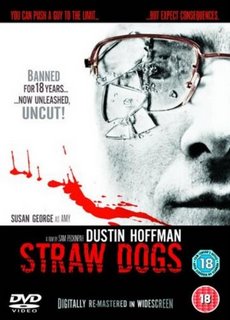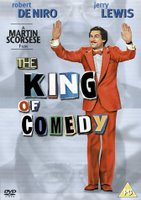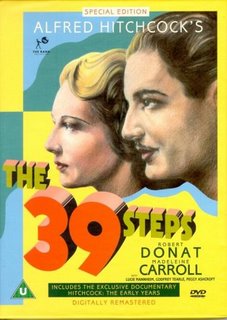Beyond Books: recent DVD acquisitions
Picked these up in HMV sale recently, @£2.99 to £3.99 -- incredibly good price indeed, in British standard. (Of course you cannot compare it with HK$19 DVDs from 雷射影音etc.)

The
Shawshank
Redemption
(dir. Frank Darabont, USA, 1994)

Straw Dogs
(dir. Sam Peckinpah, USA, 1971)

The Raging Bull
(dir. Martin Scorsese, USA, 1980)

The King of Comedy
(dir. Martin Scorsese, USA, 1983)

The Thirty-Nine Steps
(dir. Alfred Hitchcock, UK, 1935)

The
Shawshank
Redemption
(dir. Frank Darabont, USA, 1994)
- I was first introduced to this film years ago by former colleague Joanna Ng who lent me her VCD and persistently urged me to watch it. My first impression was simply 'not bad, quite interesting', and I was not particularly enthusiastic.
- It was until I watched it again on British TV last year that I noticed the brilliant details in its narrative, apart from the thematic dimension which has been discussed a lot in some circles.
- The film was much underrated and unnoticed when it came out, probably overshadowed by the massively popular Forrest Gump from the same year.
- By virtue of its exploration of human hope and identity, this is to be (and in fact already is) an important piece that is frquently mentioned in the discussion of theology and cinema.

Straw Dogs
(dir. Sam Peckinpah, USA, 1971)
- This film was banned from the British screen for its excessive violence when it first came out, and perhaps also because of its depiction of a foreigner (American) and his English wife being assaulted in their home in English countryside.
- I would be interested to look at its representation of 'cultural clash' between an American intellectual (the protagonist [Dustin Hoffman] is an academic mathematician) and unsophisticated Southern English yokels, as well as to ponder on the changing tolerance of violence on screen.
- Yet, according to the literature, deep down inside it is a story of a failed marriage. Even more interesting.

The Raging Bull
(dir. Martin Scorsese, USA, 1980)

The King of Comedy
(dir. Martin Scorsese, USA, 1983)
- I am not really a big fan of Martin Scorsese, but undeniably he is probably the filmmaker in contemporary USAmerican cinema who is most explicitly interested in religious themes and motifs, and also the most theologically sophisticated.
- I still remember watching his Taxi Driver (1976) in 油麻地華盛頓戲院. As a young Christian, I was simply stunned by the film's violent depiction of redemptive act and saviour image in a modern form. Looking back, it was possibly the earliest seed for my life-long journey of engaging with media, theology, and culture. (A very long engagement indeed, haha!)
- Scorsese's films have been the subject of a number of interdisciplinary works in theology and cinema. The most notable one is Christopher Deacy's PhD thesis written in the late 1990s, which is one of the earlier doctoral works in this field. (Published as Screen Christologies: Redemption in the Medium of Film. Cardiff: University of Wales Press, 2001.)
- The Raging Bull (1981) is often renowned as one of his best films. My extremely vague memory of this film is from my viewing of it some 25 years ago. Two months ago, I met someone who just completed his PhD in Spain last year with an in-depth study on the religious dimension of this film. Too bad the whole study was written in a language that I could not understand a single word (Spanish), so I could only listen to the author's presentation.
- The King of Comedy (1983) flopped disastrously when it came out. I have no memory of having watched it at all, even though it was released in my most active years of cinema-going.
- Despite being criticised by many as 'anti Christian', there should be little doubt that The Last Temptation of Christ (1988) is by far one of the most theologically sophisticated and provoking cinematic representations of the earthly life of Jesus. My criticism is its being boring and unentertaining rather than being theologically problematic.

The Thirty-Nine Steps
(dir. Alfred Hitchcock, UK, 1935)
- Renowned as a high point of Hitchcock before he moved to Hollywood.
- I have never watched any cinematic adaptation of The Thirty-Nine Steps, though there are a few of them. My personal memory of the story (in fact only memory of the title) is from Form 3 in Miss Szeto's class, using the book as an English class reader.


0 Comments:
Post a Comment
<< Home